Our gay travel guide to Moldova is based on our personal experience: gay highlights, things to do, LGBTQ rights, and more…
Moldova is all about wines. Lots of delicious, fine wines that you've probably never heard of. What used to be a small slice of the Soviet Union is now one of the most underrated parts of Europe begging to be discovered.
So big is the wine scene of Moldova that the country famously has the largest underground wine cellar in the world. The Milestii Maci cellars are as notorious as they are humongous, holding a record 1.5 million bottles of wine.
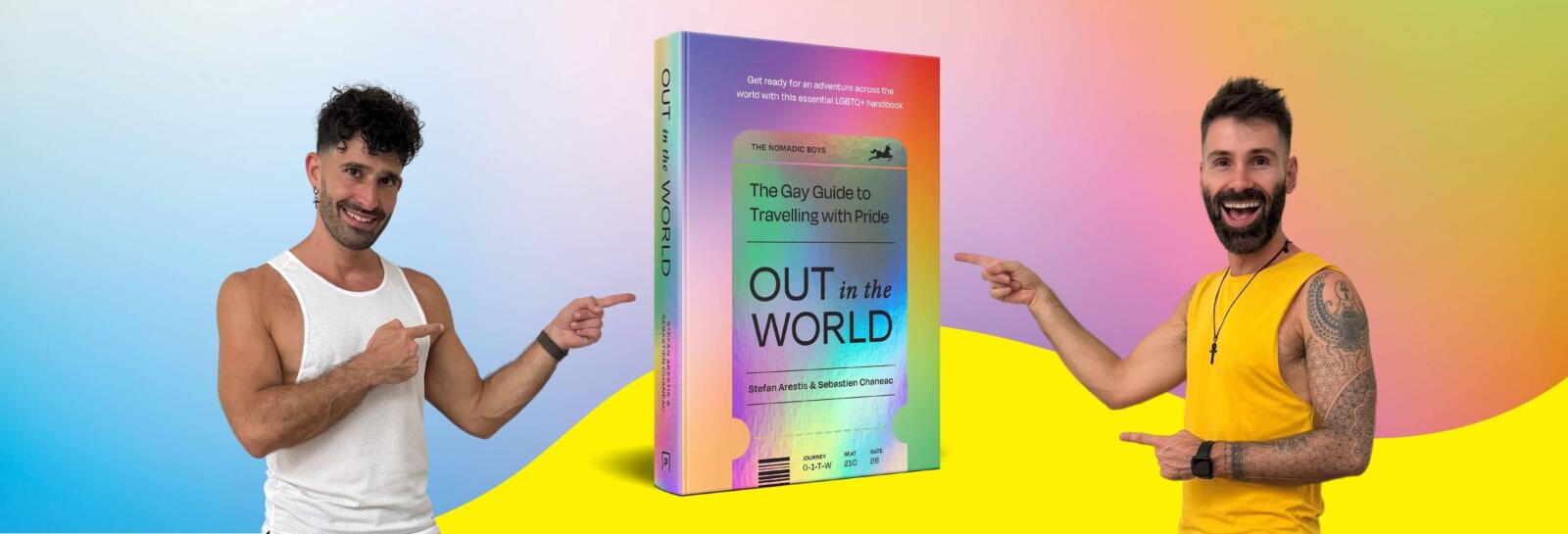
There are lots of fun things to see and do in this undiscovered part of Eastern Europe, but as is the case with most places in the region, LGBTQ rights have a lot of catching up to do. We summarise our experience traveling around Moldova in this detailed gay country guide.
Heads up: We just wanted to let you know that this post contains affiliate links. That means if you book something through one of those links, we'll get a small commission, at no extra cost to you. It helps us keep our blog going – so thank you in advance for your support! ♥
Gay dating in Moldova…
The general attitude towards homosexuality is not positive in Moldova. While gay dating apps like Scruff or Grindr aren't explicitly banned, we do recommend using a VPN like those offered by ExpressVPN so you can use the internet anonymously to make new friends!
Gay rights in Moldova
Moldova, sadly, is strongly influenced by the very conservative Eastern Orthodox Church, which frowns on LGBTQ rights. Anti-discrimination laws for hate crimes and gender identity are yet to be passed and the country implemented a constitutional ban on same-sex marriage in 1994, which is still in place.
On the plus side, being gay in Moldova is legal (since 1995) and anti-discrimination laws exist in employment and in the media. In addition, gays are (theoretically) allowed to serve openly in the army and the right to change legal gender was introduced (but only following a psychiatric diagnosis). The country also has a proactive LGBTQ community that has had a successful Pride March every year since 2013. The “LGBT Solidarity March”, takes place every May despite the large anti-gay protests taking place at the same time:
How safe is gay travel to Moldova
Despite the lack of proactive LGBTQ laws in Moldova, what does this mean in reality for us gay travelers?
Society is extremely socially conservative, believing that marriage should only be between a man and a woman, deeply frowning on anything “different” to this model. The younger generation of Millennials is more open-minded and liberal in their outlook, which gives hope for positive changes for the LGBTQ community of Moldova.
As a gay couple traveling in Moldova, we felt that we had to go back in the closet when in public, much like we felt when traveling in Russia. We're not saying it's dangerous in Moldova for gay travelers, simply that it's best you avoid any PDAs and publicising your sexuality or relationship.
In terms of a gay scene, there is next to nothing. There are no official gay bars or clubs in Moldova. At best, in the capital city, Chisinau, there are a handful of gay friendly bars and clubs to check out.
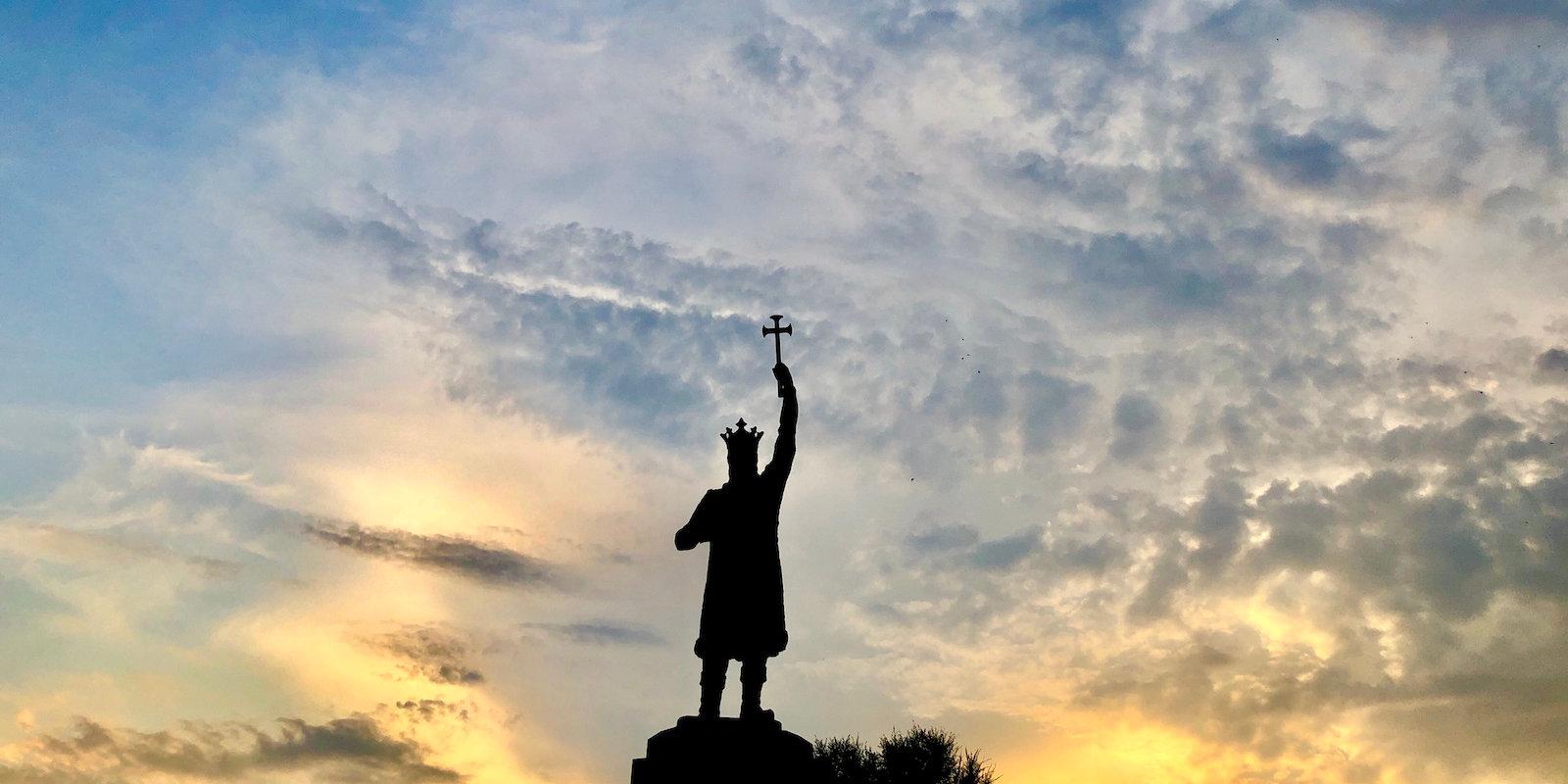
Top places to visit in Moldova
Moldova is a stunning country to visit. There are places to explore all around, however, infrastructure and public transport are very poor so we recommend traveling to places on a tour. Also note, that English is not well spoken in Moldova (Romanian and Russian are the country's main spoken languages), which makes getting a taxi extremely challenging!
For this reason, we recommend LGBTQ travelers base themselves in the capital city, Chisinau, and do day trips to other parts of the country from there. Some of the highlights in Moldova we recommend are:
Chisinau
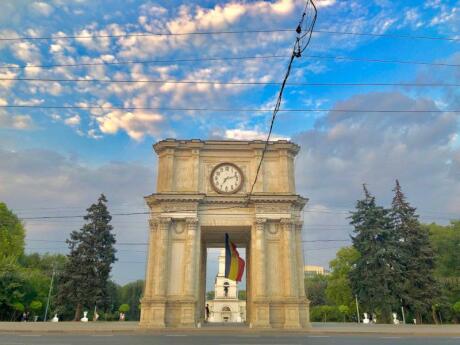
Chisinau is a useful base for your trip in Moldova although it feels a bit sad. Whilst there was life in the day, especially around the central areas, at night it felt like being in a ghost town. The street lighting in Chisinau is very poor so most roads are pitch black in the evening. It's very safe, but we often found ourselves relying on our iPhone torchlights. Highlights to check out in Chisinau are the Stefan cel Mare statue, the cute Triumphal arch, and a whole bunch of churches dotted around the two. There are also a handful of gay friendly bars and clubs in Chisinau to check out, like Night Club, Barbar, Mojito Terasa and Bar 513.
Cricova Winery
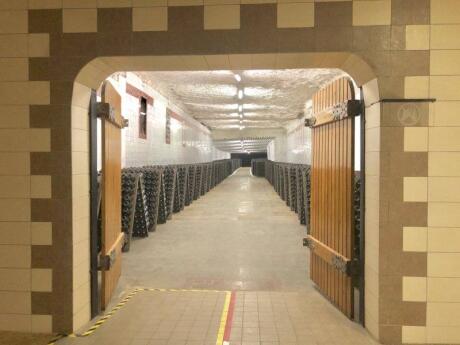
Cricova is the most famous and commercial of all of Moldova's many wineries. It's internationally famous for its sparkling white wine, which of course you get to sample during a tour. We highly recommend visiting, just to explore the underground cellar. It's huge – like a massive underground city. You need a buggy train to get around. But note it gets cold down here, so bring a jumper! You can visit Cricova as part of a tour or independently. If you do it yourself, you'll need to call them to reserve a time “slot”, but make sure you get your hotel to arrange a taxi as very few drivers speak much English and the usual apps like Uber, Lyft and Bolt don't work in Moldova.
Orheiul Vechi Monastery
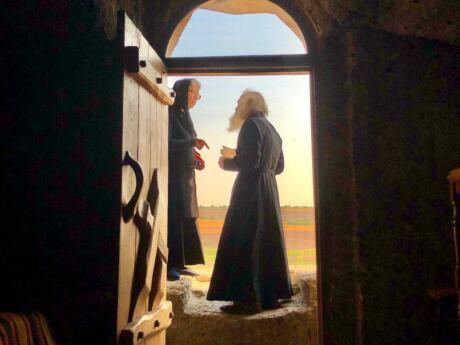
The Orheiul Vechi Monastery is one of the most impressive and unique things we've ever seen in our travels. It’s a cave monastery carved into a massive limestone cliff located out in the Moldovan countryside. It used to be inhabited by monks who lived in tight quarters within the caves, which you can still see today (just mind your back!). Next to the Monastery is the village of Orheiul, which has undergone a huge transformation for tourism. The views from the Monastery of the village and the area surrounding it are worth the journey alone.
Transnistria
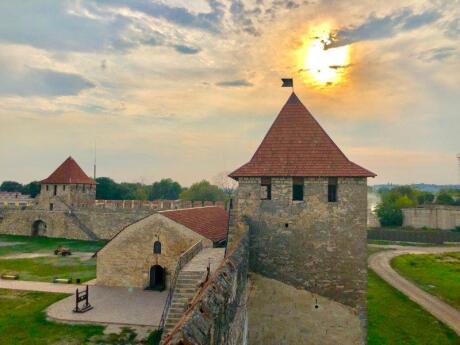
Transnistria is a breakaway part of Moldova, which declared itself an independent nation following a civil war in the 1990s. They have their own flag, national anthem, currency (the Transnistrian rubble), military, government and laws. They reject Moldova and instead look to Mother Russia who supports them financially. Russian is widely spoken across Transnistria, sometimes Romanian as well, but English is rarely spoken here. The signs are all in Russian and the architecture like an outdoor Soviet museum, especially in the capital city, Tiraspol. We also recommend heading to the aptly named city of “Bender”(!) which has a pretty Fortress which you can visit and climb up to get some pretty impressive views.
Soroca Fort
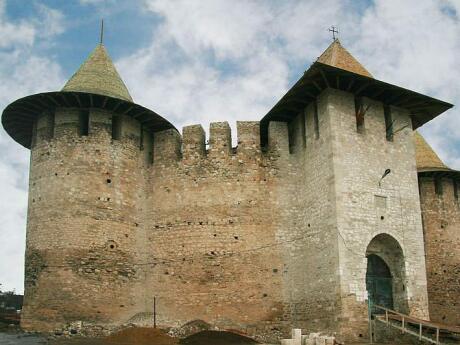
Soroca Fort is a medieval fortress located in the city of Soroca. It was established in 1499 by the Moldavian Prince Stephen the Great or Ştefan cel Mare in Romanian – what a great name eh? The fort features interesting rounded fortifications, which would better resist projectile attacks. But we just think it's super cute with those conical turrets that look like wizard's hats. Since the fort is built on the banks of the Dnister River, you can even stand on the battlements and watch a ferry transporting cars across to Ukraine.
Castel MIMI
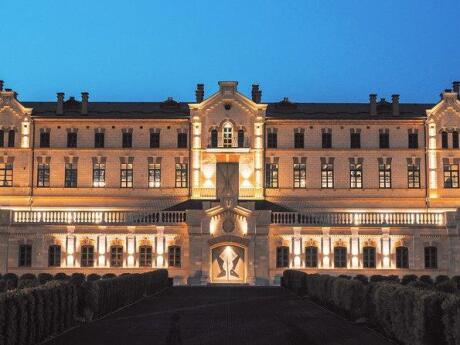
Castel MIMI is a really unique experience. Blending a winery, resort, museum, art gallery and restaurant in a stunning chateau, this is definitely a must-visit! You can book a guided tour to learn all about the history of the winery from its beginnings in 1901 until today. You can also have extensive wine tastings with canapes, or enjoy a meal in the restaurant called “White Owl”. The gardens at MIMI are opulent and sensational, reminding us of Versailles in France. You can even stay at Castel MIMI in one of seven architecturally designed rooms overlooking the swimming pool, for the ultimate luxury experience in Moldova.
Pride and gay friendly events in Moldova
The main gay event in Moldova is the annual Pride event in Chisinau, which coincides with IDAHO (International Day Against Homophobia, Transphobia, and Biphobia) in mid-May. We've also included a few other interesting events in Moldova to check out:
Moldova Pride (May)
The first gay Pride event in Moldova was held in 2002, but it faced mass opposition, cancellations, bans and attacks by fundamentalist religious Orthodox groups. Not to mention, President Igor Dodon chose to align himself with the anti-gay movement, going as far as to congratulate the radicals! In 2018 police protected the march participants against the radicals, while in 2019 there were no clashes reported but the President invited citizens to instead take part in the ‘anti-gay' family festival. Moldova Pride takes place in May and is organized by the GenderDoc-M group. You can check their Facebook page for info on the next event.
MUST Fest (September)
Must Fest is an annual music and wine festival organized by the Cricova winery in September. As well as plenty of opportunities for wine tasting, the program includes a handicraft fair, exhibitions, art, magic shows, an excursion to the Cricova cellars, a concert and all sorts of delicious traditional dishes to enjoy with your wine. It takes place in the center of Chisinau (on the square in front of Government House) and you can purchase tickets when you get there. Keep an eye on the Cricova winery Facebook page for details of the next Must Fest.
Chisinau Wine Festival (October)
The Chisinau Wine Festival takes place at the end of the grape harvest, usually the first weekend in October. The square of Stefan cel Mare is taken over by stalls selling wine, food, and crafts, while processions of musicians and dancers parade through the streets. This is a lovely way to get acquainted with Moldovan culture as there are a variety of folk shows. Tourists are even encouraged to try on some traditional clothing and then learn each of the national dances.
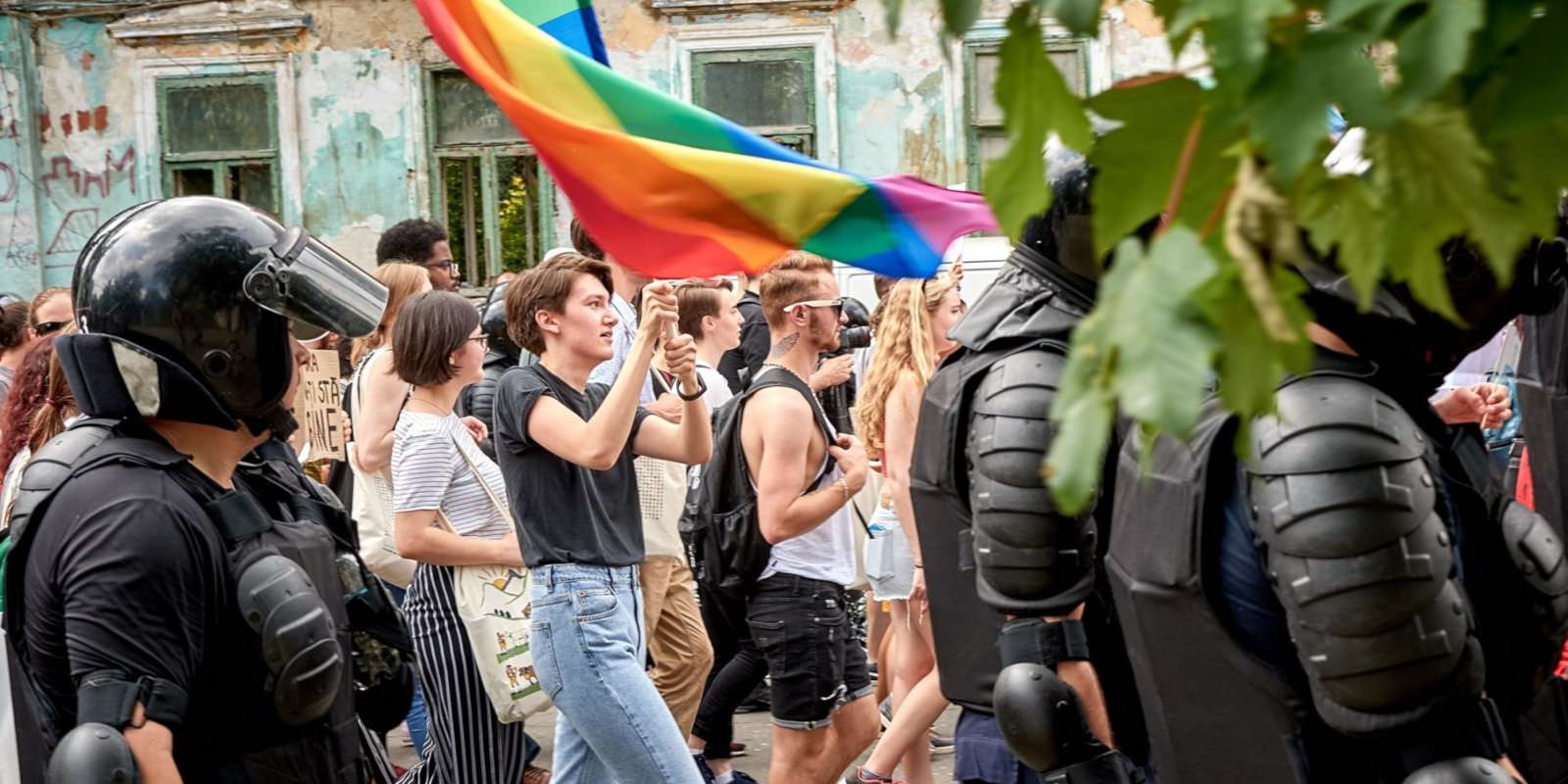
Food and drinks of Moldova
The local cuisine in Moldova is heavily influenced by Romania but also draws inspiration from Russia, Ukraine, Greece and Poland. The region's fertile soil produces plentiful fruits, vegetables, grains, meat, milk and, of course, grapes – remember the wine industry is an integral part of the Moldovan economy.
Wine
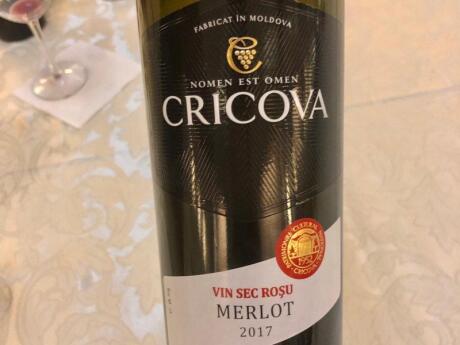
Moldova has a well-established wine industry, with four main wine regions producing red, white and sparkling varieties. Cricova winery (see above) is the most famous producer of sparkling white wine, made using the classical French method. Most of Moldova's wines are exported to Poland, Romania, Russia and the US. We strongly recommend trying lots of wine while visiting Moldova. Many local families even plant their own vines around their homes and make home-made wine using recipes that have been handed down through the years.
Chisinau Beer
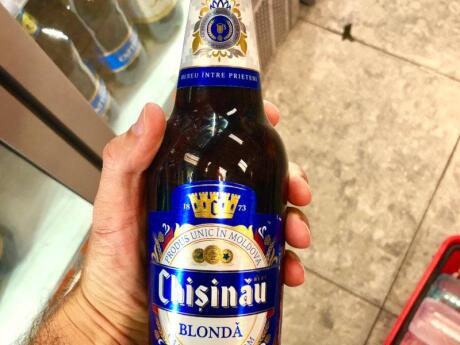
While Moldova is known more for its wine than its beer, there are some good varieties if you prefer a nice cold beer with your meal. Chisinau Brewery makes some of the best beer we tried in Moldova, which you can either buy in supermarkets or visit the brewery itself for a tour. While you do need to book ahead, the tour is free and gives you a chance to sample all their varieties. We really liked their blonde beer and they even make a non-alcoholic beer which tastes just as good as the alcoholic variety. There's a restaurant at the brewery as well, making it the perfect spot for a boozy lunch.
Sarmale
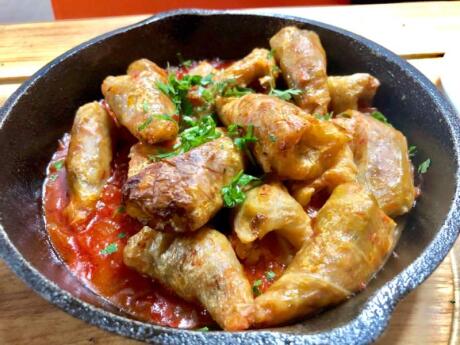
Sarmale is a traditional Moldovan dish similar to Greek dolmathakia but made with cabbage leaves instead of vines. Sarmale is usually made by stuffing the cabbage leaves with minced pork, caramelised onions and rice, then serving them as a main meal with mamaliga (see below) or just some sour cream for dipping. Best paired with a glass of red wine (of course!), you can get sarmale at most local restaurants and cafes in Moldova, so make sure you try some at least once!
Mamaliga
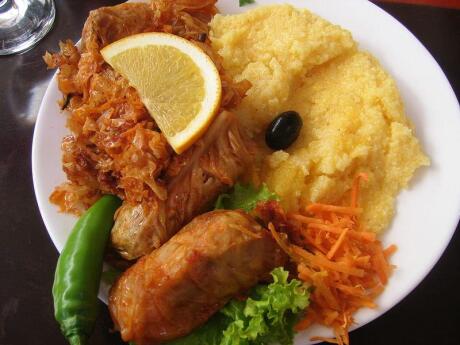
Historically known as cheap peasant food, mamaliga has become much more popular as an example of traditional Moldovan cuisine. It's a bit like polenta or cornbread and is usually served as an accompaniment to the main dish. Mamaliga is made from yellow maize flour and goes really well with eggs, ham, sausages or fish. Mamaliga is very versatile. Sometimes it's cooked to be a sort of bread substitute that you can cut and hold in your hand, while other times it's made to a thinner consistency, more like porridge. It's also sometimes served with sour cream and cheese, or it can be crushed in a bowl of hot milk.
Zeama
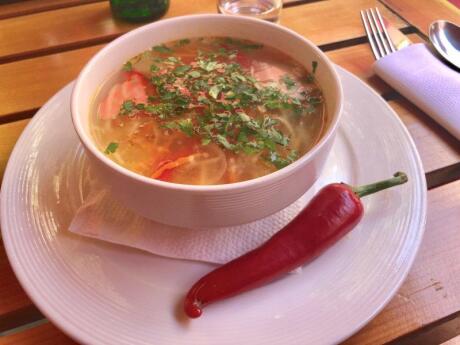
Moldovan cuisine is based a lot on vegetables and healthy dishes like hearty soups. One of the best kinds of soup we tried was zeama. This is a traditional soup served throughout the year as a main course, usually for lunch. It's made with a chicken broth base, noodles, spices and lots of different kinds of vegetables. No matter where you go in Moldova you will find some form of zeama, always accompanied by lots of sour cream and cornbread. Best of all? It's known as the ultimate hangover cure, so it's ideal if like us you went a little bit OTT on those wine tastings at Cricova…!
Plăcintă
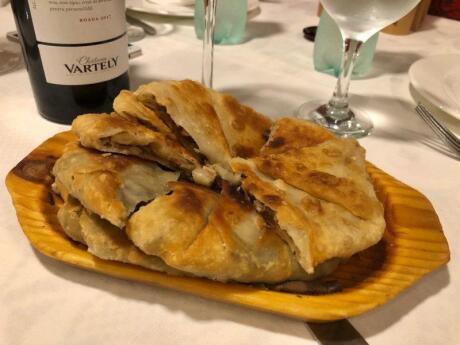
We know how it sounds but no, this has nothing to do with placenta! Plăcintă are traditional and delicious pie-like filled pieces of bread. They are made with a variety of sweet and savoury fillings, so you can try anything from cherry plăcintă in summer to pumpkin plăcintă during autumn. Other varieties include fillings of potatoes, soft cheese, apple, chocolate or even meat. You'll be able to find plăcintă everywhere in Moldova. They're sold at just about every convenience store for a quick snack as well as being a staple in every masa (large celebratory meal) in the country. The best placinta we tried was at the La Placinte – a popular local restaurant chain in Chisinau.
Tocană
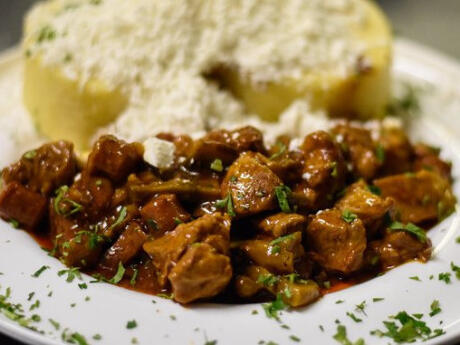
Tocană, also known as tocăniță, is a traditional Moldovian stew with Romanian influences. Traditionally consumed by shepherds in the mountains, the stew is made from beef or pork cooked with tomato, garlic and paprika, then served with mamaliga. It's often topped with a fried egg as well and can also be made using lamb, potatoes or mushrooms. Because the dish is slow-cooked for a long time, the meat just melts in your mouth! It's a delicious hearty meal to fortify yourself for all your travels throughout Moldova.
Friptura
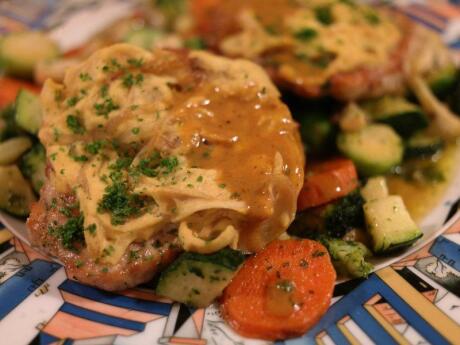
One of the most popular traditional Moldovan recipes is friptura, which is pork ribs cooked in beer with onions. The onions make the meat very sweet and yummy. Friptura is usually served with mamaliga to soak up the tasty sauce. There may be regional differences when preparing this dish, so don't be surprised if it doesn't always look the same. We guarantee that however it is served, it will always be super flavoursome. La Taifas is a highly rated restaurant in Chisinau which serves excellent friptura, along with most of the other dishes we've mentioned, so it's well worth checking out.
Plan your trip to Moldova
We've put together some handy hints and tips to help you plan your own trip to Moldova. Read on to find out everything the gay traveller should know before touching down in Chisinau:
Travel insurance: We never travel without making sure we have travel insurance to cover us in case of emergency. Anything from cancelled flights to illness can derail your plans, so it's good to know you're protected when visiting Moldova. We have been using Heymondo Travel Insurance for years and can't recommend them highly enough. They offer comprehensive and affordable cover, plus it's super easy to make a claim online.
How to get there: A few budget airlines fly to Moldova from many major cities in Europe. From Chisinau international airport you can travel to the city centre by bus, trolleybus or minibuses, although we personally prefer to book a private airport transfer so we don't need to stress about figuring out public transport with luggage. You can also travel by overnight train to Chisinau from Bucharest or drive across the border from Ukraine or Romania.
Visa requirements: Citizens of many countries in Europe, Australia and North America can visit Moldova as a tourist for up to 90 days without needing a visa. However, citizens from some countries will need to apply for an e-visa before travelling to Moldova. Check your personal visa requirements for Moldova here.
Getting around: In the capital of Chisinau, you can get around using public buses, trolleybuses or private minibuses. If you are heading out of the city there is a public bus system, although for some destinations it will be easier to just book a tour or hire a private driver. Here is a more detailed guide to getting around in Chisinau and other parts of Moldova.
Vaccinations: All travellers to Moldova should be up to date with routine vaccinations like measles, mumps and rubella. It's also recommended that most travellers be vaccinated for Hepatitis A, while some might need to be vaccinated for Hepatitis B or rabies, depending on what you will be doing while in the country. Check the CDC website for the most up-to-date vaccination information on Moldova.
Currency: The currency used in Moldova is called the Moldovan leu, or lei when it's plural. The currency code is MDL and you'll mostly see it written as L or lei. €1 converts to about 19 lei, £1 is worth around 21 lei and $1 US converts to around 17 lei.
Tipping culture: There is no real tipping culture in Moldova, apart from in some of the bigger restaurants in Chisinau which are aimed more towards tourists. Service is expected to be a lot better here, so it's also more expected that you would tip about 10% of the bill if you were happy with it.
Internet access: Free, relatively fast WiFi is available at most restaurants, cafes and hotels in Chisinau. Outside of the city coverage is a bit more spotty, so if you'll need reliable online access you will probably want to bring a portable WiFi device with you.
Online privacy: While gay dating apps like Grindr and Scruff are not explicitly banned in Moldova, the prevailing attitude towards homosexuality is not positive. We recommend using a VPN service like the ones from ExpressVPN to keep your online activities private. Their service is a reliable and affordable way to use the internet anonymously.
Accommodation: We use Booking.com when searching for accommodation in Moldova. They have the best range of options to choose from, often with free cancellation when needed, while their online service is excellent and available 24/7.
Sightseeing and adventure: When finding the best tours and things to do in Moldova (and anywhere) we love to use GetYourGuide. They have a very easy to use online booking system and their support is also available 24/7.
When to visit: Moldova has four distinct seasons, with cold winters and hot summers. The months of May/June are very pleasant, while July/August is hotter but also the peak tourist season. If you want to see beautiful autumn colours and experience the Chisinau wine festival, then October is also an excellent time to go, just make sure you bring an umbrella in case of showers!
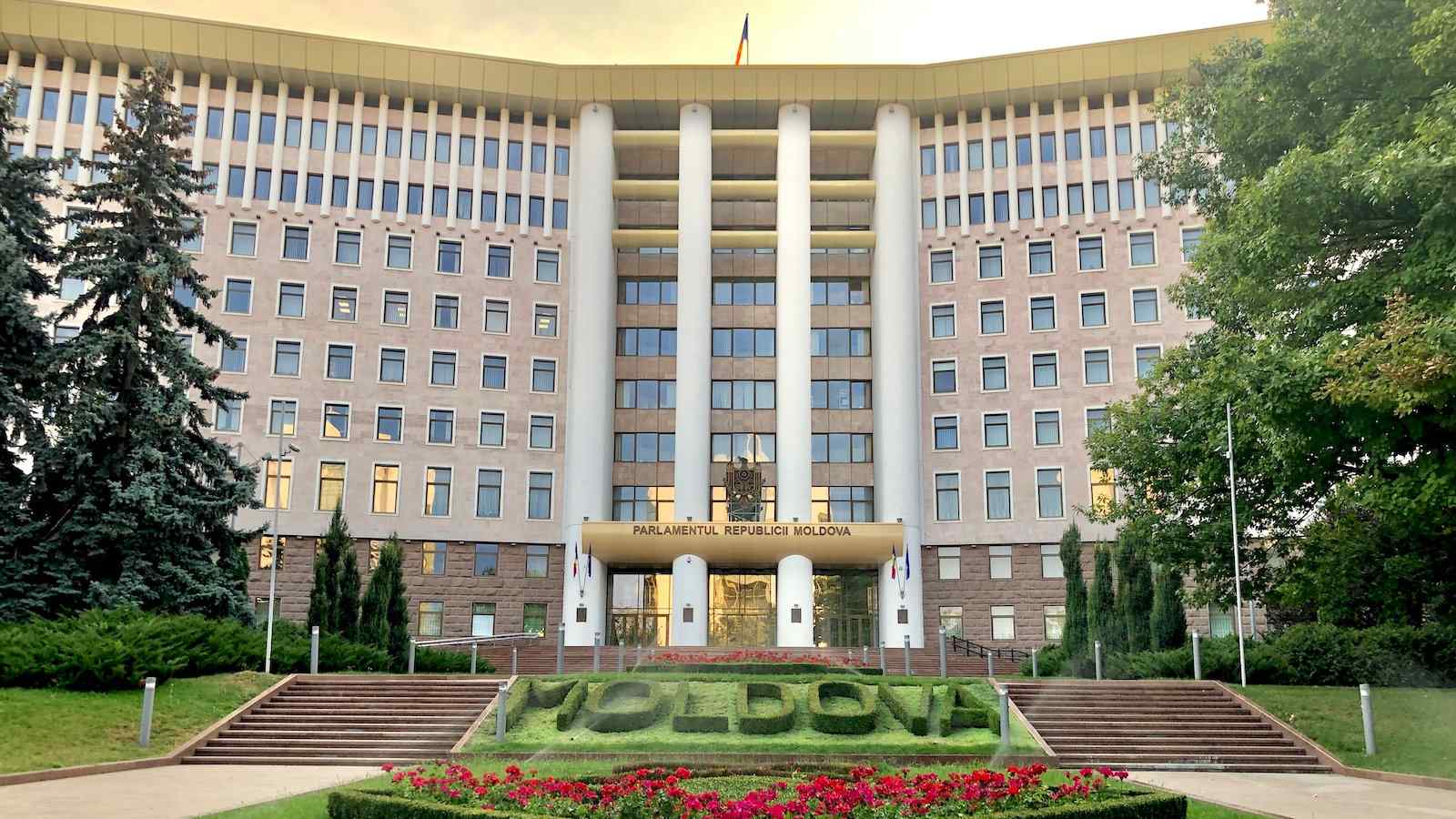
Safety tips for LGBTQ travellers to Moldova
Is Moldova safe for gay travellers? The short answer is YES, but as long as you avoid PDAs and any activism! Moldovans are kind-hearted people, super curious towards foreigners. They may not seem the most friendly at first, but once you break past this barrier, you'll make a friend for life. Also, be warned, English is not spoken much here, so make sure you have your Google Translate app to hand and download the Romanian and Russian dictionaries to use offline.
- Check official government advice before you go. We recommend you do this any time you're travelling so that you are aware of any recent developments that might create difficulties. Here are the most up to date travel details for travellers to Moldova from the UK but make sure you check your own government's advice if you're visiting from somewhere else.
- Although homosexuality is legal in Moldova, avoid public displays of affection. Society is very socially conservative and frowns on LGBTQ lifestyles. We didn't encounter any problems during our time in Moldova, but we also didn't flaunt our sexuality either.
- Just like anywhere in the world, be aware of your surroundings, especially in big cities. Petty crime is prevalent in the capital of Chisinau, but if you're alert to your surroundings then you should be fine.
- Avoid excess alcohol and drug use. Moldova is known for its wine, so you'll want to try some. Just be careful not to drink too much when in a new country, as you're a much easier target when intoxicated.
- Don't wear valuables in public. This is basic common sense. Whilst we felt very safe in Chisinau, pickpockets operate everywhere, so the more bling you show off, the more alluring you become as a target. We recommend leaving your valuables and important items locked away in your hotel safe!
- Invest in a good money belt. It's always better not to carry too much cash or credit cards anyway, but having a good money belt hidden under your clothes is one of the best ways we've found of ensuring your valuables stay safe and secure out of harm's reach.
Read more travel adventures like this in our book!
We've published our very own gay travel book called, ‘Out in the World'. It has all our practical safety tips, first-hand advice, and travel stories from some of our favorite destinations.
We hope it inspires you to have a fun and safe trip!
Click on the book to order:

For more inspiration:
- Read what we rate to be the gayest cities in Europe
- You might be surprised by these gay friendly cities in Eastern Europe
- If you're travelling on a budget make sure you check out these awesome gay hostels in Europe
- Find out why we love celebrating Pride in London
- Here is some inspiration for fabulous gay pride outfits to wear while you're there
- Plus, don't attend pride without packing these must-have gay pride accessories
- If you're there for pride anyway, make sure you also attend one of these excellent gay musicals and theatre shows in London
- These are the best drag clubs in London with excellent performers
- If you prefer beach life to the city, then make sure you visit some of the best gay beaches in Europe.
Like this post? Pin it
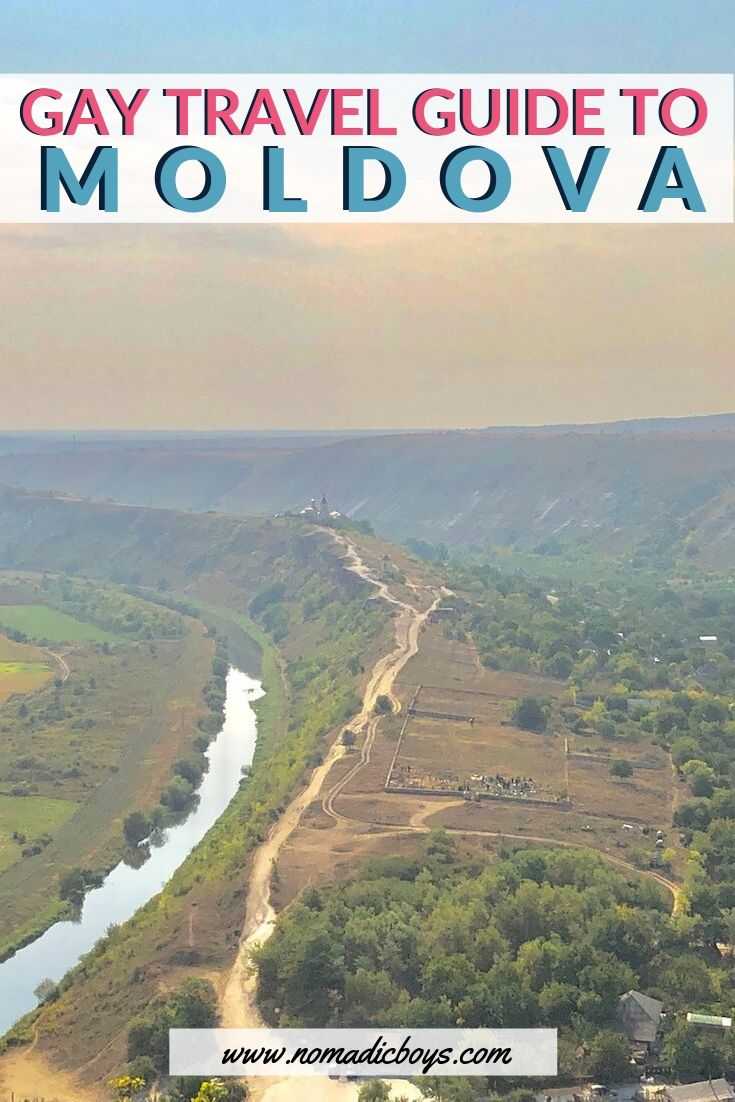

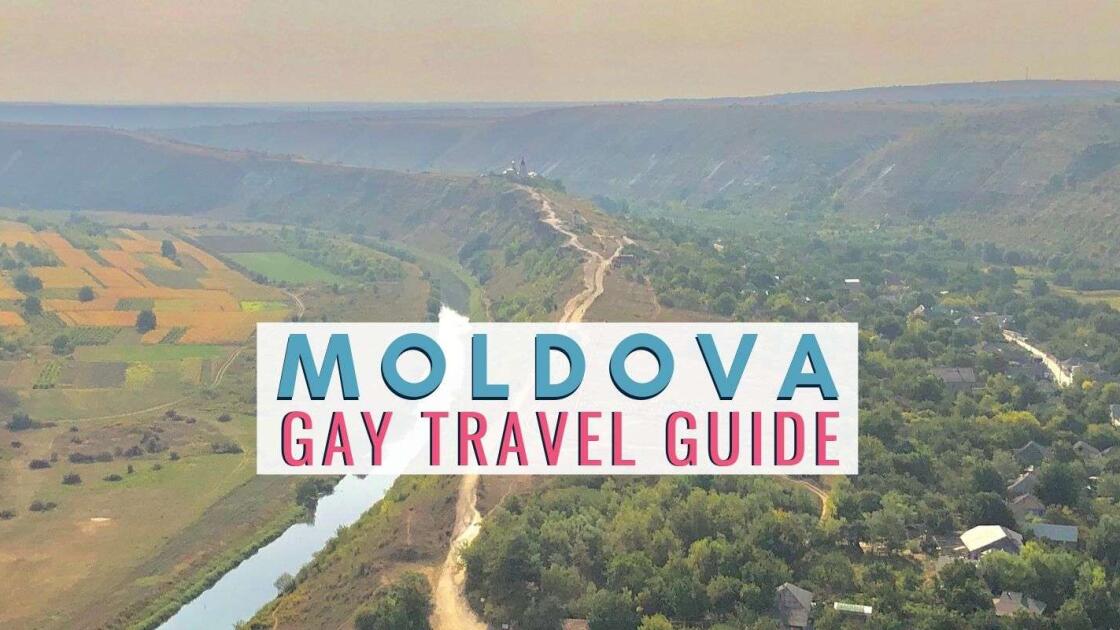
Andrzej
Tuesday 3rd of December 2019
Didnt know a lot of these things about Moldavia. Thanks for these gay tips Stefan.